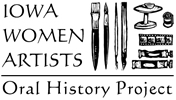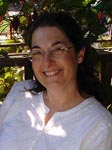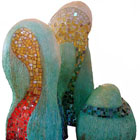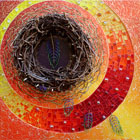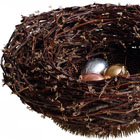MARCIA JOFFE-BOUSKA
artwork | audio | statement | 2008 update | galleries
artwork
audio 
- Family (60 sec. | 414KB): listen | read
- Autobiographical (54 sec. | 369KB): listen | read
- Artwork (62 sec. | 424KB): listen | read
- Criticism (42 sec. | 290KB): listen | read
- Advice (51 sec. | 350KB): listen | read
- Rewarding (62 sec. | 427KB): listen | read
artist statement
My work is colorful, complex, and layered with meaning. It reveals my interest in cultural icons and the transcendent nature of art. I often incorporate common imagery, rich in symbolism and associations, with organic forms, found objects and traditional and nontraditional art media and techniques.
Themes investigate nuances of the human condition and parallel the significant threads of my life. Present in all of my work is the continual impulse to understand the unfathomable and seek meaning in the most mundane of experience. Put succinctly, my art is my way of making sense out of life.
2008 update
How has your life changed in the years since I interviewed you?
Parenting responsibilities have changed since my kids are now grown. A son-in-law has joined our family, too. I've eliminated some of the part-time jobs I used to have, and currently supplement studio work with commissions and teaching residencies. Another change that has happened in the past 10 years is that I acquired a pet cat.
What kind of artwork are you doing now? How has your artwork changed in the last 10 years?
The work I do now is sculptural. Ten years ago I was working predominantly in painting and drawing media and was just beginning some explorations into small found object sculpture. I describe my current work as mixed media
sculpture. I incorporate found objects and traditional and non-traditional art media in both relief work and sculpture in the round. I feel less restrained by media in my current work—I can use whichever media and technique best communicate my concept. Much of my work still involves color and in this my background as a painter is still very evident.
What motivates you to continue making art?
I truly believe that art is my way of understanding/interfacing with the world. I suppose life motivates me to continue to make art. I know that in many cases it would be easier if I were NOT making art, but I recognize that things are simply not "right" for me when I'm not engaged in this process. (And my family notices this too!)
audio text
Family
I was married four years before my daughter was born. And I remember talking to older women artists and asking them of their experiences, and being really stunned because one of them said, "You raise your family; twenty years goes by quickly, and then you pick up your work"—which is what she had done. And I remember coming home horrified, because I didn't think I'd be able to do that. So I scheduled a show at the gallery for maybe six months after my daughter was born. And it all revolved around my daughter and the changes and just a different sensibility. I think I titled it, How I Spent My Summer Vacation, because she was born in June. I really had to prove to myself that I could continue; I could be an artist and be a mother. And I'm not saying that I haven't made compromises. I've adjusted my work in ways that I can continue working with a family. And the family, that's my priority. But it's never stood in the way, I don't feel, of what I am doing in the studio.
Autobiographical
My current [1999] artwork I would call mixed-media sculpture. And it's probably more overtly autobiographical. I think that all my work is autobiographical—and maybe all artwork is, but certainly like with the abstract pieces it would not be as accessible to the viewer. Now, I'm deliberately allowing myself to let some of my experiences be visible in the work. It's been kind of a gradual process to the point that I've moved to three-dimensional work. I've enjoyed being able to use all different art experiences and art disciplines in the piece, not just restricted by maybe something that's two-dimensional paint and canvas, but I could use art materials as well as found object—stuff that doesn't have a traditional art association. So it's been fun; I've enjoyed it.
Artwork
I would say my work was pretty much abstract—both drawings and paintings—until the kids were born. And then I really started doing representational things that were mainly drawing, occasionally a painting, and then I would have my separate abstract airbrush work. And it worked that way for a while. And then I wanted to do something and couldn't bring myself to continue the thread that I was doing with the paintings. And I had been gardening a lot at that time, so that's when I started doing garden drawings—very, very small, very intimate watercolor and colored pencil drawings. And then through gardening I would dig up all this stuff accidentally—bones and detritus, junk—that had been buried, and I started making talismans and fetishes. For me, that was kind of liberating, because I didn't work to any great extent three-dimensionally, and to use junk and stuff and make these little precious objects that had all these mystical associations—that was really different. So it was sort of out of those two experiences that the current work came.
Criticism
I think criticism is good, because it tells you how people are responding to your work, but probably what's more important to me is to be able to turn it off. I do enough self-criticism; I think most artists do. I think every artist has to get to the point where they maybe are their own cheerleader or believe in themselves. Otherwise, you know what, I feel like there's not always enough positive there if you rely on what you're getting from outside to keep doing it. It has to come from inside. So maybe that's the first skill you learn as an artist is to be able to be focused enough to tune out what is negative, what impedes you from doing the good work that you know you could do.
Advice
Get as much of the basics down as you can, experiment, learn all you can about the techniques and media, because you don't know what you're going to be using later on. I mean, life unfolds and throws very unusual opportunities to you. Most of what has happened to me has not been planned, and has not related in any direct way to any preparation I've ever had. Do and experience and soak up as much as you can. If you intend to do this as a career, get some good business skills. Be focused, and not allow yourself to be too buffeted by other people. It's always good to keep an open ear and be able to evaluate and re-evaluate your work, and take into account the wisdom other people can give you. But you need to be kind to yourself and supportive of yourself, and open to all sorts of possibilities.
Rewarding
When I look at art, that's what I look for, I guess, is the connection. And the art that I have purchased or chosen to hang in my house, it's because I have a continuing sense of wonder when I look at it. And that's what I would hope—just for there to be some kind of connection, maybe some kind of joy, maybe some kind of insight that they would get by looking at my work, that would connect with their life. In general, an artist's work reveals an awful lot about themselves, but for the viewer to gain insights into his or her own life from that, that's really something special.
I certainly am sold on the arts and what they add to my life, and also how it helps us to know ourselves. Being able to pursue my work with the consistency that I have has just been essential for me. I'm hopeful that I'll be able to do this until I die. It's extremely rewarding. It's the most challenging thing I could think of to do. It pushes me to the limit of what I think I can do. And that's not a bad field to get into, if you could do that.
